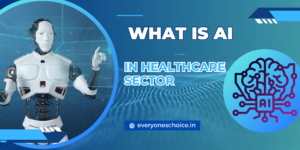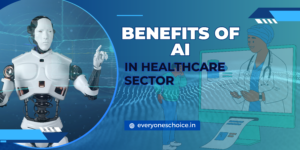Benefits of AI in Healthcare Sector
The benefits of AI in the healthcare sector are transforming medical services, making treatments more effective, and improving patient care. AI-driven technologies enhance diagnostics, streamline hospital operations, and offer personalized treatment plans. As AI continues to evolve, its impact on healthcare becomes more profound, ensuring faster, more accurate, and accessible medical solutions.
What is AI?

AI, or Artificial Intelligence, refers to computer systems that replicate human intelligence to process data, recognize patterns, and make informed decisions. In healthcare, AI technologies, such as machine learning and natural language processing, help doctors diagnose diseases, recommend treatments, and manage patient records efficiently. By integrating AI into healthcare, professionals can focus more on patient care rather than administrative tasks.
Key Benefits of AI in Healthcare Sector

1. Enhanced Diagnostics and Early Detection
AI-powered tools analyze medical images, lab reports, and patient records to detect diseases like cancer, heart conditions, and neurological disorders in their early stages. AI-driven diagnostics improve accuracy and reduce human errors, allowing doctors to provide timely treatments and improve survival rates.
2. Personalized Treatment Plans
AI customizes treatment plans based on a patient’s medical history, genetic data, and current health conditions. By using AI in precision medicine, doctors can recommend treatments that are most effective for individual patients. This approach minimizes side effects and speeds up recovery.
3. AI in Drug Discovery and Development
AI accelerates drug discovery by analyzing massive datasets and identifying potential drug candidates faster than traditional methods as a result. Pharmaceutical companies use AI to predict drug effectiveness, reducing research costs and bringing life-saving medications to patients sooner.
4. Remote Patient Monitoring and Telemedicine
AI-powered wearables and monitoring devices track vital signs in real time, allowing doctors to provide continuous care. Telemedicine platforms use AI chatbots and virtual assistants to assist patients, making healthcare services more accessible, especially in remote areas.
5. Efficient Hospital and Administrative Operations
AI streamlines hospital processes by automating tasks such as scheduling appointments, managing medical records, and processing insurance claims. This improves efficiency and allows healthcare professionals to focus on patient care rather than paperwork.
6. Predictive Analytics for Disease Prevention
AI predicts potential health risks by analyzing medical records and lifestyle patterns. With these insights, doctors can implement preventive measures, reducing the chances of chronic diseases and minimizing hospitalizations. AI-driven predictive analytics lead to better long-term healthcare planning.
Future of AI in Healthcare
The future of AI in healthcare looks promising as advancements continue to reshape the industry. AI-powered robots assist in surgeries, virtual health assistants guide patients in managing their health, and AI-driven mental health support systems offer real-time assistance. As AI technology evolves, healthcare will become more personalized, efficient, and accessible, improving outcomes for patients worldwide.
Conclusion
In short, benefits of AI in the healthcare sector are revolutionizing medical treatments, diagnostics, and hospital operations. AI enhances efficiency, improves accuracy, and provides better patient experiences. As AI continues to evolve, its integration into healthcare will lead to groundbreaking innovations, making medical care more effective and widely accessible. Embracing AI in healthcare ensures a future where technology and medicine work together to enhance human lives.
Great article! We always appreciate valuable insights like these. Thanks for sharing!
Healthcrm.ai